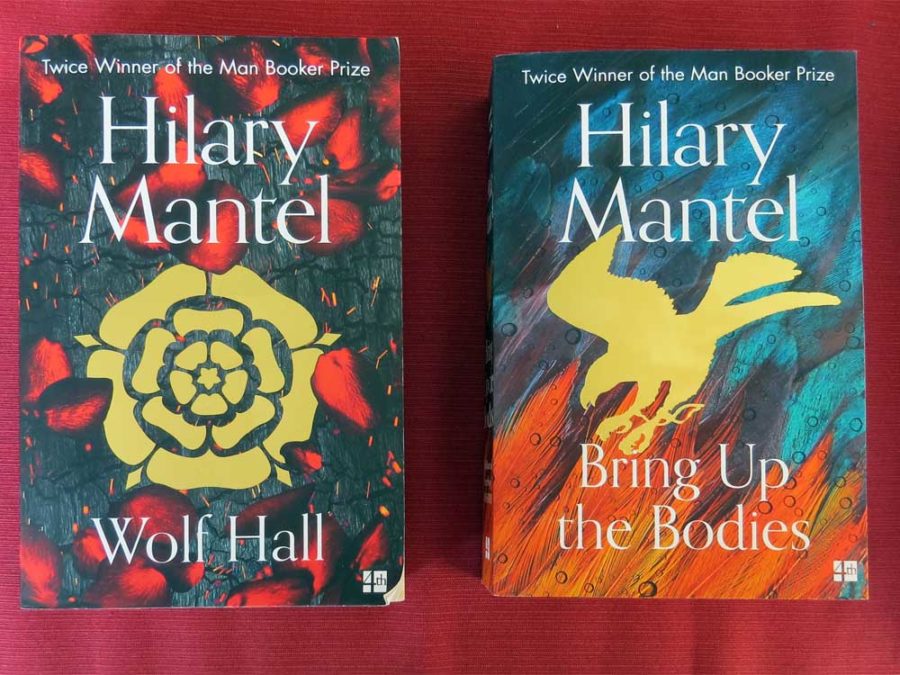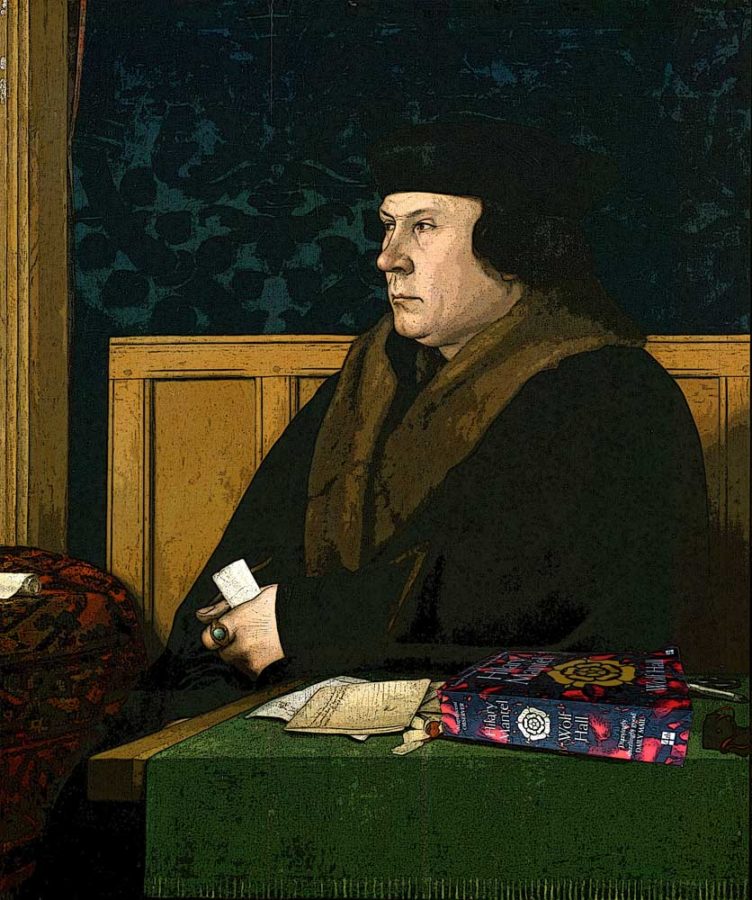As I’ve written earlier, despite much encouragement, I long postponed starting Hilary Mantel’s epic trilogy about Thomas Cromwell in the reign of Henry VIII. Partly from an idea that it would conflict with me writing my own historical fiction. I was afraid of falling into plagiarism.
I gave up on that in the spring and started reading volume one, Wolf Hall, in April. I’ve just completed Bring up the Bodies. The final volume, The Mirror and the Light is waiting on the bookshelf.

Point of view
A book review at this stage seems superfluous. Instead I want to share a couple of observations from the point of view of a would-be writer. Me, that is.
One of the many fascinating things about the two novels I’ve now read is, just, the point of view.
All stories, all well-told stories, are presented from a clear point of view. That can be the point of view of one or more of the characters in the story, or it can be from the point of view of the author more or less in the role of a god. Authors may mix and match, slipping from one point of view to another. This can be done with greater or lesser dexterity. Or they may stick fast to a single point of view for the duration of a chapter, a section or the whole novel.
All stories also use one or other of the grammatical persons: I, you, he, she, they etc. The most common are I and s/he. If the author uses I then the story is a first person account, and the narrator of the story can most easily be identified with the author. (This is true even if the author goes out of their way to separate themself from the I of the novel.) The story takes the form, perhaps, of a diary. If the author uses he or she, then the story is told in the third person and the author places a distance between themself and their point-of-view character.
A subtle intimacy
In Wolf Hall and Bring up the Bodies (and I presume in The Mirror and the Light too) Hilary Mantel does something subtly different. The point of view is Thomas Cromwell’s and the grammatical person is he, but it early becomes apparent that the narrator he is indistinguishable from Cromwell’s I. The intimacy of the narration is such that you are constantly under the impression that it is Cromwell himself telling the story. That he is referring to himself in the third person.
As a reader, I found it took me a bit of getting used to in Wolf Hall. But once I’d figured out what Mantel was doing, once I got used to it, it felt very natural. And opening Bring up the Bodies, after an intervening gap of four other novels, I had no difficulties returning to this special point of view delivery.
A moment’s ambiguity
It does open for ambiguity. Take this passage from early in Bring up the Bodies. Cromwell, King Henry and a group of courtiers are visiting the Wolf Hall estate of the Seymour family. At the supper table, one of the courtiers, Francis Weston “a reckless and extravagant young gentleman”, chooses to have some fun at Cromwell’s expense. He is rude about Cromwell’s deceased wife and daughters. He refers to Cromwell’s lowly background as the son of a blacksmith.
The conversation canters off in some other direction … he thinks, Weston is goading me, he knows that in Henry’s presence I will not give him a check; he imagines what form the check may take, when he delivers it.
In that passage, the first he, and the last two, are Cromwell thinking as third person. The second he refers to Weston, and the unusual I is an example of Cromwell reporting his own thought directly.
Tearing it out of context like this as an illustration doesn’t do Mantel justice. The switch from first person thought to third person thought within the same sentence looks more confusing than it is in fact. In context it is clear. There is a moment’s ambiguity, reading the final subclause. Wait! Who’s “he” here? But only a moment’s.
He, Cromwell
In Wolf Hall, though there are instances when I don’t think it is quite as clear to whom he refers. I notice that in Bring up the Bodies Mantel makes more use of the clarifying phrase he, Cromwell. A page or so after the above quote, we find this. He says – he, Cromwell: ‘I should like to know if this is written down…’
Inevitably I find myself wondering whether this is first/third person is a structure I could use myself, writing Elin’s Story. I’m tempted, but I’m not at all sure I could pull it off.
Naming the Bodies
The second thing I wanted to take up is more specific to historical fiction, and to fiction based on real events and involving real people. What to do about the names?
Most authors will bend over backwards to differentiate their characters by name. You don’t want to confuse your reader by having two or more characters with the same name. Or even similar names. But when you are working with people who once lived, their names are already given. You’re stuck with them. Sometimes, in some periods, in some strata of society, certain names are popular. In Tudor-era England, for example, there was a surprisingly limited selection of first names used by a depressingly large number of people.
It’s a wonderful thing to see how Hilary Mantel has coped with this problem.
Cast list
First of all, she has revived that classical aid to Russian literature in English translation: the cast list. The first few pages of Wolf Hall and Bring up the Bodies are given over to lists of characters grouped by reference to certain professions or places of residence. This is useful for readers who can flip back to double check on the people in the chapters they are reading. Also for me, because I can use the lists to count, just among the key characters of the novel, at least four Marys, five Elizabeths, seven Henrys and no less than eleven men called Thomas.
Mantel does what I suppose anyone would do faced with this problem, she uses family names, titles, short forms, nicknames and alternate spellings. One Henry becomes Harry, at least one Thomas becomes Tom, a Mary is Maria.
Mantel lets Cromwell himself draw attention to this at one point. Jane Seymour’s elder sister was referred to as Lizzie by her husband. When her husband dies and Elizabeth Seymour returns to live in her family home, Cromwell is happy to learn the family call her Bess. He would be reluctant to hear her called Lizzie. Why? Because Lizzie was the name of his own deceased wife, Elizabeth Cromwell.
Call-Me
The funniest alternative name, which is a running joke through the books, is held by Cromwell’s one-time protege Thomas Wriothesely. The young man, in Wolf Hall, habitually asks people to “call me Risley”. This leads Cromwell’s household to refer to him as “Call-Me-Risley”. By the end of Bring up the Bodies Call-Me has become the name they use, or Cromwell at least, to his face.
Reading from the cast of characters in Bring up the Bodies, we have Thomas Cromwell himself, Thomas Avery, Thomas Wolsey, Thomas More, Thomas Howard, Thomas Boleyn, Thomas Seymour, Thomas Wyatt, Thomas Cranmer, Thomas Wriothesely and Thomas Audley.
Thomas Wolsey becomes “Wolsey” or “the Cardinal”, Thomas Howard is the Duke of Norfolk or just “Norfolk”. Thomas Boleyn is “Monseigneur”, a name he chooses for himself, while Thomas Seymour, the younger of the Seymour brothers, becomes Tom. Cranmer, Wyatt and Audley are more or less always referred to by their family names.
Crumb
While most of the Thomases in the book find their first names reduced or replaced, Thomas Cromwell himself revels in a plethora of names. He is Thomas and Tom, but as a young man he is also Tommaso and Hercules. He is rarely identified by a title. At one point someone addresses him as “my lord”, which he quickly contradicts. To most people he is Cromwell, but also, familiarly, Crumb. When addressed in French (or by Queen Anne Boleyn affecting a French accent) he is Cremuel.
And all these names, repetitive or diminutive, spread across this wide panoply of characters, are handled lightly and with assurance. It’s a virtuoso performance.
I am looking forward to reading The Mirror and the Light, but I’ll postpone opening it for a few weeks. I don’t want to overdose and I do want to draw the pleasure out a bit longer.





